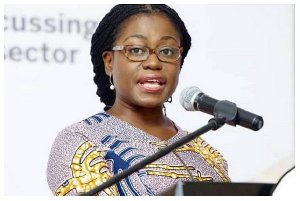Microfinance institutions (MFIs) have been urged to strengthen their governance structures, enhance risk management, and adhere to the regulatory framework set by the Bank of Ghana (BoG) to better serve the country’s informal sector.
According to Elsie Addo Awadzi, Second Deputy Governor- BoG, who said this, in a speech read on her behalf at the 3rd Ghana Microfinance Institutions Network (GHAMFIN), Non-Bank Financial Institutions (NBFI) Dinner and Awards Night, 2024, this when done, will safeguard the institutions and build trust among the public, ensuring the sector continues to play its pivotal role in financial inclusion.
“Microfinance institutions (MFIs) have a pivotal role to play in this financial inclusion agenda. You are the link between formal financial services and the underserved populations. Your work in providing savings, credit, and insurance to those who need it most cannot be overemphasised.
“However, with this role comes the responsibility to adhere to the regulatory framework set by the Bank of Ghana. Compliance ensures that the sector remains stable and capable of serving the needs of its clients effectively,” she elaborated.
Additionally, she encouraged all microfinance institutions to embrace responsible lending practices and to develop innovative products that cater to the unique needs of clients while ensuring their own sustainability.
Furthermore, she indicated that the country’s FinTech sector report for the second quarter of 2024 provides encouraging data- as over 24 million mobile money accounts have been registered, with an annual transaction volume surpassing GH¢1.9 trillion. “These figures are not just numbers- they represent millions of Ghanaians who now have access to financial services that were previously out of reach. They symbolise the transformative power of FinTech in bridging the financial inclusion gap,” she added.
However, she lamented that the microfinance sector faces significant challenges such as- corporate governance weaknesses, inadequate risk management practices, and non-compliance with regulatory requirements that must be addressed to ensure its sustainability and effectiveness. “These challenges have led to the insolvency of some microfinance institutions and a loss of public confidence in the sector.”
Meanwhile, Ghana’s Minister of Finance, Dr. Mohammed Amin Adam, in a keynote speech read on his behalf at the event acknowledged the significant role of NBFIs in the country’s economic development saying- they are the major financial institutions that support small and medium enterprises with credit. Additionally, he indicated that government is working to improve the way the sector operates.
“An SME research report indicated that small and medium-sized enterprises contribute an estimated 70 percent of Ghana’s Gross Domestic Product (GDP), and account for approximately 85 percent of employment in the country’s manufacturing sector. It is therefore essential for NBFIs to assist SMEs develop to maximize the developmental potential of Ghana.”
Also, GHAMFIN’s Board Chairman, Mr. Bernard Joe Appeah, in his welcome address said this year’s theme is geared towards marshalling the Network’s resources to support Government’s agenda to ensure that- all the adult population in the country are financially literate. He added that financial inclusion well promoted will enable individuals and businesses to tap into new markets, increase customer base and drive economic activities positively and hence achieve economic growth.
Furthermore, he said that, reliable and available statistics on the NBFIs in the country as at the end of 2023 indicate that, there are 1, 970 member companies with 14.7 million clients nationwide with a combined asset of GH¢22.63 billion.
“In 2023, the member companies additionally, disbursed loans in excess of GH¢14.9 billion, of which 46 percent was given to micro small and medium enterprises, mostly in rural Ghana and contributed nearly 3.8 percent to GDP, provided employment for approximately 31,000 people directly out of which 38 percent were women,” he also said.
Executive Director of GHAMFIN, Yaw Gyamfi, while addressing media after the event noted that the award programme has enhanced competition and improved performance by adding value to the Network’s stakeholders, clients and general environment.
Additionally, he expressed gratitude to GHAMFIN’s board, staff, the technical committee and industry associations for the unwavering commitment in making the event a successful one.
GHAMFIN is a network of all NBFIs and associations engaged in the provision of financial and non-financial services to low income households and micro small medium enterprises.
Its mandate is to serve as a representative voice of MFIs in the country- advocating for policies and regulations that support the growth and sustainability of the sector.
The Financial Inclusion Advocacy Centre is an international action-oriented microfinance think-tank geared towards an exhaustive financial inclusion.
Business News of Tuesday, 27 August 2024
Source: thebftonline.com

















